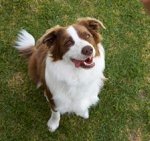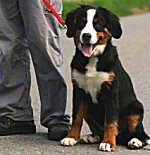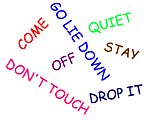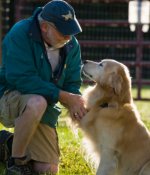Old English Mastiffs: What's Good About 'Em, What's Bad About 'Em
Old English Mastiff temperament, personality, training, behavior, pros and cons, advice, and information, by Michele Welton, Dog Trainer, Behavioral Consultant, Author of 15 Dog Books
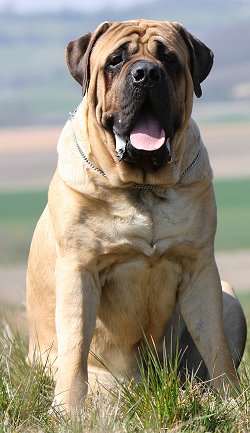
The AKC Standard says, "A combination of grandeur and good nature, courage and docility. Dignity, rather than gaiety, is the Mastiff's correct demeanor."
I use the name Old English Mastiff to distinguish this breed from other Mastiffs:
- French Mastiff (Dogue de Bordeaux))
- Italian Mastiff (Cane Corso)
- Argentine Mastiff (Dogo Argentino)
- Brazilian Mastiff (Fila Brasileiro)
- Neapolitan Mastiff
- Tibetan Mastiff
- Bullmastiff
The Old English Mastiff is calm and quiet (as an adult!) but he belongs in a roomy home with a spacious fenced yard, so that his massive body has stretching room. To stay fit, he needs daily walks (whether he seems to want them or not), but he isn't a jogging partner.
Mastiffs also need companionship – lots of it every day. This is not a breed to leave alone for many hours.
Most English Mastiffs are polite with everyone, but there is timidity (even extreme shyness) in some lines, and aggression in others. To ensure a stable temperament, English Mastiffs need earlier and more frequent socialization than many other breeds. This socialization should continue throughout their life. Watchfulness should actually be discouraged, as it's best for all concerned if a Mastiff intimidates by his presence alone, rather than by his behavior.
Some Old English Mastiffs are peaceful with other animals, while others are dominant (even combative) with dogs of the same sex.
Though mildly stubborn, this good-natured dog responds well to patient, consistent leadership.
Mastiffs tend to be "gassy" dogs, which bothers some people. They also snore, drool, and slobber – big time! Obviously this is not the breed for people who need a tidy household.
If you want a dog who...
- Is massive and powerful
- Has a sleek easy-care coat
- Is calm and quiet indoors (as an adult)
- Needs only moderate exercise
- Is usually mild-mannered, yet makes an imposing watchdog because of his size and self-assurance
An Old English Mastiff may be right for you.
If you don't want to deal with...
- A huge dog who takes up a lot of space in your house and car
- A heavy dog who wants to sit on your feet and lean his weight against your leg
- Destructiveness when bored or left alone too much
- Potential aggression or fearfulness toward people if not chosen carefully and socialized enough
- Potential aggression toward other animals
- Strong-willed mind of his own, requiring a confident owner who can take charge
- Snorting, snuffling, wheezing, grunting, loud snoring
- Slobbering and drooling
- Gassiness (flatulence)
- Serious health problems and a short lifespan
- High price tag
- Legal liabilities (public perception, insurance problems, increased chance of lawsuits)
An Old English Mastiff may not be right for you.
 |
Dog Breed Traits – Which Traits Are Right For You? In this brand new series, I'll help you decide which dog breed traits would best suit you and your family, your home and yard, and your lifestyle, so you can choose the best dog breed for your family. |
Keep in mind that the inheritance of temperament is less predictable than the inheritance of physical traits such as size or shedding. Temperament and behavior are also shaped by raising and training.
FREE eBooks by Michele Welton
![]() "Respect Training for Puppies" and "Teach Your Dog 100 English Words" are free step by step guides to teaching your pup to be calm and well-behaved.
"Respect Training for Puppies" and "Teach Your Dog 100 English Words" are free step by step guides to teaching your pup to be calm and well-behaved.
![]() "11 Things You Must Do Right To Keep Your Dog Healthy and Happy" is a free guide to keeping your dog mentally, physically, and emotionally happy and healthy so you can enjoy a longer lifetime of companionship.
"11 Things You Must Do Right To Keep Your Dog Healthy and Happy" is a free guide to keeping your dog mentally, physically, and emotionally happy and healthy so you can enjoy a longer lifetime of companionship.

More traits and characteristics of the Old English Mastiff
If I was considering an English Mastiff, I would be most concerned about...
- Providing the proper balance of exercise. Young Mastiffs need enough exercise to keep them lean and healthy, but not so much that their soft growing bones, joints, and ligaments become over-stressed and damaged. Similarly, adult Mastiffs need enough exercise to keep them in shape, but definitely not running or jogging, and not in hot or humid weather for fear of overheating. The proper amount of exercise can be difficult to regulate in giant breeds.
- Providing enough socialization. Some English Mastiffs are naturally friendly, but most tend to be a little standoffish with strangers, and some individuals have protective instincts. It's essential to socialize your English Mastiff very thoroughly when he is young, so that he learns to recognize the normal behaviors of "good guys." Then he can recognize the difference when someone acts abnormally.
Without careful socialization, a Mastiff may be suspicious of everyone. This can lead to either aggression or shyness, and both attitudes are dangerous in a giant breed. Fearful Mastiffs can bite defensively if they feel cornered. And it's no fun trying to drag a huge frightened dog along by the leash in public.
- Potential animal aggression. Many English Mastiffs are perfectly fine with other dogs and cats. But some are not. I would not risk keeping an Mastiff with another dog of the same sex. And be aware that some Mastiffs do display predatory behavior toward cats and other animals that run. Obviously a dog of this size and power is capable of seriously injuring or killing other animals.
- The strong temperament. Old English Mastiffs are usually easygoing and good-natured, but they're not pushovers to raise and train. Some are passively resistant, while others are more actively willful or dominant (they want to be the boss). You must show them, through absolute consistency, that you mean what you say.
To teach your Old English Mastiff to listen to you, "Respect Training" is mandatory. Follow my free online training programs.
- Mastiff "sounds." Old English Mastiffs snort, grunt, and snore loudly. These sounds are endearing to some people, nerve-wracking to others.
- Slobbering. Most people are not prepared for how much Old English Mastiffs slobber and drool, especially after eating or drinking. When they shake their heads, you will be toweling saliva off your clothes and furnishings.
- Gassiness (flatulence). All short-faced breeds gulp air when they eat, and that air has to go somewhere, after all. However, commercial diets make flatulence worse by including fibrous or hard-to-digest ingredients. Mastiffs who are fed a heavily meat-based diet have much less trouble with gassiness.
- Serious health problems. The lifespan of an Old English Mastiff is very short – less than 10 years. And an alarming number of Mastiffs are crippled by bone and joint diseases and/or succumb to cancer at only 6 or 7 years old. Read more about English Mastiff Health
- Legal liabilities. Some insurance companies may cancel your homeowner's policy if you own a Mastiff. Your friends and neighbors may be uncomfortable around this breed. In this day and age, the legal liabilities of owning a giant breed that looks intimidating and has a history as a war dog should be considered. People are quicker to sue if such a dog does anything even remotely questionable.
The truth is that the Old English Mastiff is probably "too much dog" for the average household.
My best-selling books – now available FREE on my website
 Respect Training For Puppies: 30 seconds to a calm, polite, well-behaved puppy is for puppies 2 to 18 months old. Your puppy will learn the 21 skills that all family dogs need to know. Click here to read for free.
Respect Training For Puppies: 30 seconds to a calm, polite, well-behaved puppy is for puppies 2 to 18 months old. Your puppy will learn the 21 skills that all family dogs need to know. Click here to read for free. Teach Your Dog 100 English Words is a unique Vocabulary and Respect Training Program that will teach your adult dog to listen to you and do what you say. Click here to read for free.
Teach Your Dog 100 English Words is a unique Vocabulary and Respect Training Program that will teach your adult dog to listen to you and do what you say. Click here to read for free. 11 Things You Must Do Right To Keep Your Dog Healthy and Happy helps your dog live a longer, healthier life. Get my honest advice about all 11 Things before you bring home your new puppy, because some mistakes with early health care cannot be undone. Click here to read for free.
11 Things You Must Do Right To Keep Your Dog Healthy and Happy helps your dog live a longer, healthier life. Get my honest advice about all 11 Things before you bring home your new puppy, because some mistakes with early health care cannot be undone. Click here to read for free.Related posts you might enjoy



